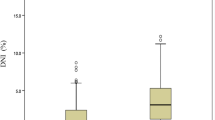Abstract.
In acute-phase Kawasaki disease, neutrophils cause injury to the coronary arterial endothelium through the production of elastase. Previous research has demonstrated the modulation of neutrophil function and kinetics, such as development and maturation, by granulocyte colony-stimulating factor (G-CSF). To examine the correlation between G-CSF and cardiac complications in Kawasaki disease, functional activity of serum G-CSF and cytokines was measured by enzyme-linked immunosorbent assay in 30 patients with acute-phase Kawasaki disease aged 2 months to 5 years. The mean serum G-CSF was higher in the 1st week of Kawasaki disease than during weeks 2 to 4, and G-CSF was significantly higher in patients with coronary artery dilatation (CAL) than in those without. There was no significant difference in the activity of other cytokines studied or white blood cell counts between the patients with CAL. Conclusion: granulocyte colony-stimulating factor is correlated with coronary artery dilatation in acute-phase Kawasaki disease and increased neutrophil function may contribute to the pathogenesis of coronary arterial endothelial injury in these patients.
Similar content being viewed by others
Author information
Authors and Affiliations
Additional information
Electronic Publication
Rights and permissions
About this article
Cite this article
Samada, K., Igarashi, H., Shiraishi, H. et al. Increased serum granulocyte colony-stimulating factor correlates with coronary artery dilatation in Kawasaki disease. Eur J Pediatr 161, 538–541 (2002). https://doi.org/10.1007/s00431-002-1018-5
Received:
Revised:
Accepted:
Published:
Issue Date:
DOI: https://doi.org/10.1007/s00431-002-1018-5




